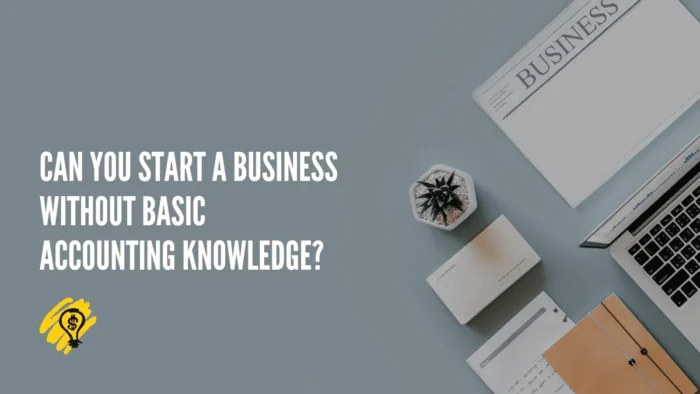Starting a business is an exciting journey filled with opportunities, challenges, and growth.
However, one question that often emerges for budding entrepreneurs is: “Can I start a business without knowing accounting basics?” The simple answer is no. While it’s possible to launch a venture without an in-depth understanding of accounting principles, having at least basic knowledge or reliable support in this area can save you from significant pitfalls down the road.
This article will shed light on some essential financial elements you might want to consider when starting your enterprise. We’ll also show you how you can go about learning this information.
Can You Start a Business Without Knowing Accounting Basics?
The short answer is no. You can’t start a business without knowing accounting basics. Even if you have the capital to hire an accountant, it’s still beneficial to know what your accountant is doing. This base knowledge will make it easier for you to budget and increase your profits.
With that said, most entrepreneurs won’t have the cash to hire an accountant. This means you’ll need to balance your own bookkeeping, understand your deductions, and save for taxes all on your own. There are a few ways you can go about learning how to manage your bookkeeping.
How Can an Entrepreneur Learn Accounting Basics?
For one, you could get a degree, take a course, or apply for a certification exam. For example, you could become a Chartered Financial Analyst after passing an exam. You can use these guidelines on passing the CFA Level 1 Exam if you want more information about the process.
A formal education or certification can provide you with two main things: expertise and credentials. If something happens to your business, you can use this certification to find work. Not only that, but you can rest assured that the information you’re receiving is correct.
If you can afford it, you could hire an accountant to counsel you. This is much cheaper than employing a permanent accountant, and it enables you to do your own bookkeeping.
Alternatively, you could use resources like blogs, books, and videos to learn accounting basics. While there’s no guarantee that the information you find online is correct, it can help you start your journey. Always consult with an accountant before filing your taxes with the IRS.
What Accounting Information Do You Need to Know?
The accounting information you’ll need will depend on the type of business you run. With that said, most entrepreneurs or business owners will need to learn the following things.
How to Track Your Income and Expenses
Recording your income and expenses is important for business owners, but the first decision you’ll make is how to track said information. You can use an Excel or Google spreadsheet or accounting software like Quickbooks. Using accounting software is definitely the easier option.
The moment you start making money or spending is the second that you start keeping a record. This ensures that the information is easier to find at a later date. As a rule, you should keep your original receipts. Keep these receipts until the statute of limitations on your returns expires.
How to Track Your Assets, Liabilities, and Equity
Your assets, liabilities, and equity are kept on a balance sheet. Accounts typically used the formula: assets = liabilities + owner’s equity, to produce this document. Liabilities are what your company owes, assets are what your company owns, and equity is the amount you’re left with.
While you won’t get much use out of your balance sheet in the beginning, you’ll need to start one if you want to receive financing. Banks and lenders love to see these figures when reviewing your business. It gives them a good sense of where your business is as a whole.
How to Open a Separate Business Bank Account
Opening a business bank account is important, as it keeps your personal and business finances separate. To open one, you need your EIN or social security number, business formation papers, and ownership agreements. Then, you must choose a bank that suits your needs.
The process itself is simple: visit the chosen banking institution and request to open a ‘business checking account.’ Then, they’ll guide you through the application process. After approval, you’re ready to start managing your business finances independently from personal ones.
How Much You’ll Need to Save For Taxes
Estimating the amount you’ll need to save for taxes when starting a business can be a complex task. Your tax amount varies depending on your income, expenses, and the type of business you have. Generally, it’s advised to put aside at least 25-30% of your profits for taxes.
If you expect to pay more than $1,000 in self-employment or corporate taxes, you’ll need to pay your taxes quarterly. The IRS has guidelines for how to do this. After your first year, your quarterly taxes will be based on your previous year’s taxes, making filing a lot easier.
How to File Sales Taxes (If Necessary)
If your business involves selling physical products or certain services, you’ll likely need to file sales tax. The process begins by registering for a seller’s permit through the tax department in your state. If required, you might also need to sign up for tax permits in other states.
After registration, periodically (quarterly) calculate your total sales and the amount of sales tax collected from customers, then file a sales tax return with your state and make a payment if due. Always consult with a tax professional to ensure correctness in fulfilling this obligation.
How to File Your Income Taxes
Filing income taxes is a big part of owning a business. For sole proprietorships, LLCs, and partnerships, business income is reported on personal tax returns using Schedule C forms with the IRS. Corporations typically have more complex filing requirements and may use Form 1120.
To file, gather all documentation related to your revenue, deductions, and expenses for the year. Total these amounts, then calculate your net profit or loss, and record this on the appropriate form. An accountant or CPA will then take these forms and file them with the IRS.
How to Budget and Forecast
Budgeting and forecasting are vital elements in the groundwork of any enterprise. You can start creating a budget by identifying your current and projected income streams, fixed costs like rent or salaries, and variable expenses like marketing costs or manufacturing supplies.
Use these figures to create a budget that guides your spending while keeping your financial goals front and center. In parallel, forecast future income based on market trends, growth rates, and other factors. This will help you anticipate potential challenges before they occur.
In Conclusion…
Starting a business without deep knowledge of accounting might seem overwhelming, but remember that every entrepreneur begins somewhere. With reliable resources, counseling, and professionals by your side, navigating the financial jungle can become less overwhelming.





